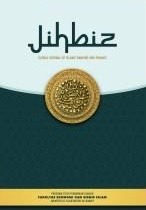DOES SHARIAH FINTECH CARRIES MORE ETHICAL IMPACTS THAN SHARIAH BANKS: GLOBAL INDEX ANALYSIS ON INDONESIAN INDUSTRY
DOI:
https://doi.org/10.22373/jihbiz.v6i2.25565Keywords:
Fintech, Ethical, Social, Impacts, Shariah, Global IndexAbstract
This article provides an analysis of Indonesia’s Shariah Fintech industry’s ethical impacts agaisnt Shariah banks, particularly from a global index point of view. The Shariah fintech industry experienced enormous development, particularly in the post-pandemic era with a holistic impact socially and ethically. Meanwhile, the Sharia banking industry did not have sufficient impacts on society. Does this mean that Shariah fintech has more ethical impacts and received wider acceptance, particularly those are categorised as unbanked and underbanked entrepreneurs? Hence, the study will be qualitatively analysed using the global index approach in order to find the result. The research adopted the library research approach and used the published and research articles as secondary data alongside the analysis. The study concluded that Shariah fintech successfully contributed ethically to society, particularly for those who were grouped as unbanked categories. Shariah banks should hands-in-hand with the Shariah fintech to create a more impactful business ecosystem and meaningful collaboration with marginalised enterprises.References
Abdillah, Leon, and Yogi I. Mukti. "Indonesian sharia fintech services and social media usage." Bulletin of Social Informatics Theory and Application 5.2 (2021): 97-106
Ahmed, Nisar, Khadija Rasheed, and Muhammad Talha. "Islamic banking perspective on shariah compliant FinTech (financial technology) model." Available at SSRN 3563030 (2019).
Alfarizi, Muhammad, and Ngatindriatun Ngatindriatun. "Indonesian Halal Msme Open Innovation with Islamic Fintech Adoption." Jurnal Akuntansi dan Keuangan Indonesia 19.2 (2022): 5.
Alsaghir, Mohammad. "Digital risks and Islamic FinTech: a road map to social justice and financial inclusion." Journal of Islamic Accounting and Business Research (2023)
Alshater, Muneer M., et al. "Fintech in islamic finance literature: A review." Heliyon 8.9 (2022).
As-Salafiyah, Aisyah. "Islamic Fintech During Covid-19 Outbreak: A Bibliometric Review." Islamic Finance and Technology 1.1 (2023).
Azizah, Siti N. "The adoption of FinTech and the legal protection of the digital assets in Islamic/Sharia banking linked with economic development: A case of Indonesia." The Journal of World Intellectual Property 26.1 (2023): 30-40.
Bakri, Mohammed Hariri, and Siti Norbaya Yahaya. "Conceptualization of Spiritual intelligence quotient (SQ) in the Islamic Fintech adoption." Islamiyyat 42.1 (2020): 113-122.
GIFR. (2024). Global Islamic Fintech Report 2023-2024. Dinar Standard.
Jauhari, Farah Farhana, and Syarah Syahira Mohd Yusoff. "A Preliminary Investigation: Examining The Utilisation of Islamic Fintech Credit by Asnaf Microentrepreneurs, Their Access to Microfinance Through Zakat Institutions, and its Impact on Income and Subjective Well-Being." AZKA International Journal of Zakat & Social Finance (2024): 135-156
Karim, Sitara, Muhammad Abubakr Naeem, and Emad Eddin Abaji. "Is Islamic FinTech coherent with Islamic banking? A stakeholder's perspective during COVID-19." Heliyon 8.9 (2022)
Kurbonova, Mumtozaposho. "Potential Of Islamic Fintech As An Innovative Solution To Social Inclusion." Iqtisodiy taraqqiyot va tahlil 1.6 (2023): 26-32.
Mahsyar, Nun Maziyyah. "Islamic Fintech and Its Concept: a Case Study of Kitabisa Fintech Company Indonesia."
Maulida, Syahdatul. "Clustering research on Islamic fintech studies." Islamic Finance and Technology 1.1 (2023).
Muryanto, Yudho Taruno, Dona Budi Kharisma, and Anjar Sri Ciptorukmi Nugraheni. "Prospects and challenges of Islamic fintech in Indonesia: a legal viewpoint." International Journal of Law and Management 64.2 (2022): 239-252.
Muryanto, Yudho Taruno. "The urgency of sharia compliance regulations for Islamic Fintechs: a comparative study of Indonesia, Malaysia and the United Kingdom." Journal of Financial Crime 30.5 (2023): 1264-1278.
Naifar, Nader, ed. Impact of financial technology (FinTech) on Islamic finance and financial stability. IGI Global, 2019.
Osman, Adibah Alawiah, et al. "The Exalted Islamic Ethics towards Conquest of Fintech." Information Management and Business Review 15.4 (SI) I (2023): 173-180.
Rufaidah, Fathi, et al. "A review of the implementation of financial technology (Fintech) in the Indonesian Agricultural Sector: Issues, access, and challenges." International Journal of Financial Studies 11.3 (2023): 108
Rumman, Naseem Abu. "The Influence of Fintech on Promoting Economic Stability Within Developing Countries." Business Series 3.1 (2024): 159-182.
Sudarwanto, Al Sentot, Dona Budi Kharisma, and Diana Tantri Cahyaningsih. "Islamic crowdfunding and Shariah compliance regulation: problems and oversight." Journal of Financial Crime 31.4 (2024): 1022-1036.
Downloads
Published
Issue
Section
License
Jihbiz : Global Journal of Islamic Banking and Finance Education uses license CC-BY-SA or an equivalent license as the optimal license for the publication, distribution, use, and reuse of scholarly works. This license permits anyone to compose, repair, and make derivative creation even for commercial purposes, as long as appropriate credit and proper acknowledgement to the original publication from Jihbiz : Global Journal of Islamic Banking and Finance is made to allow users to trace back to the original manuscript and author. Readers are also granted full access to read and download the published manuscripts, reprint and distribute the manuscript in any medium or format.

